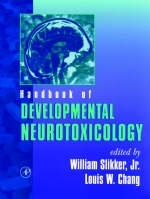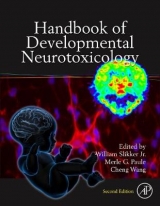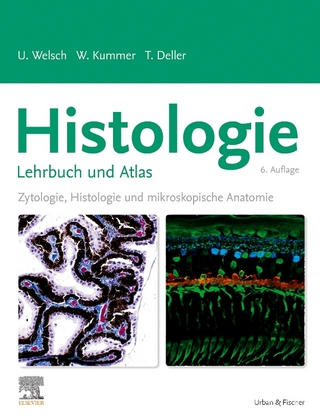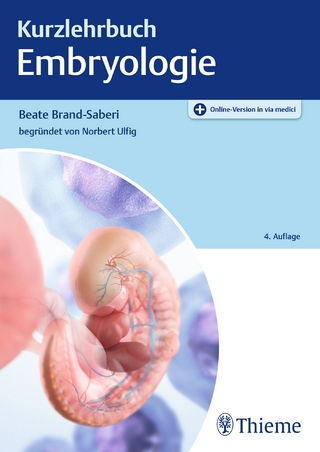
Handbook of Developmental Neurotoxicology
Academic Press Inc (Verlag)
978-0-12-648860-9 (ISBN)
- Titel erscheint in neuer Auflage
- Artikel merken
The Handbook of Developmental Neurotoxicology provides a comprehensive account of the impacts, mechanisms, and clinical relevances of chemicals on the development of the nervous system. The book is written by internationally recognized experts on developmental neurotoxicology, covering subjects from basic neuro-development to toxic syndromes induced by various chemicals. It is an important text for both students and professionals who are interested in developmental neurobiology and neurotoxicology.
Dr. William Slikker, Jr. was the director of FDA’s National Center for Toxicological Research (NCTR) before his retirement. He received his Ph.D. in pharmacology and toxicology from the University of California at Davis. Dr. Slikker holds adjunct professorships in the Department of Pediatrics, as well as the Department of Pharmacology and Toxicology at the University of Arkansas for Medical Sciences. He has held committee chairmanships or elected offices in several scientific societies including the Teratology Society (serving as president) and the American Society for Pharmacology and Experimental Therapeutics (chair, Developmental Pharmacology Section and member, Program Committee). Dr. Slikker is also the co-founder and past president of the MidSouth Computational Biology and Bioinformatics Society. He is currently associate editor for NeuroToxicology and associate editor for the “Environmental Health section of Experimental Biology and Medicine. He is the past president of The Academy of Toxicological Sciences and the Society of Toxicology. He is a recipient of the 2014 George H. Scott Memorial Award from The Toxicology Forum and was invited to present the Warkany Lecture at the 2015 annual meeting of the Teratology Society. In early 2019, the Academy of Toxicological Sciences selected Dr. Slikker to receive the prestigious Mildred S. Christian Career Achievement Award. The Society for Birth Defects Research and Prevention selected Dr. Slikker to be the recipient of the 2022 Edward W. Carney Distinguished Service Award. Dr. Slikker has authored or co-authored over 380 publications in the areas of transplancentalpharmacokinetics, developmental neurotoxicology, neuroprotection, systems biology, and risk assessment. Dr. Slikker’s recent research has highlighted the concern for thousands of infants and toddlers who undergo longer-duration general anesthesia. He has performed research with his team and published over 25 peer-reviewed papers outlining the issue of brain-cell death and cognitive-function deficits in animal models that may result from several hours of anesthesia at a critical time of development. He has also, with the use of in vitro and in vivo techniques in rodents and nonhuman primates, defined possible mechanisms of toxicity and protective pathways to prevent the detrimental effects of general anesthesia. Through these and related scientific contributions, he has identified and characterized a host of minimally invasive biomarkers of neurotoxicity including the use of preclinical imaging (MRI, MicroPET/CT), genomic and lipidomic analysis, and modeling approaches to characterize and quantify adult and developmental neurotoxicity. He has also served on several national/international advisory panels for ILSI, HESI, CIIT, EPA, NIEHS, NAS, NIH and WHO. Louis W. Chang is a Professor in the Departments of Pathology, Pharmacology, and Toxicology at the University of Arkansas for Medical Sciences. He also served as the Director of the Toxicology Program and is the current Graduate Director of the Pathology Program in Arkansas. Aside from being the author of over 200 scientific articles, Dr. Chang also served on the editorial boards for a number of publications and scientific journals in his field. He is a well recognized scientist internationally. Dr. Chang has been recently elected as a Fellow of the Academy of Toxicological Sciences and has become a board certified Diplomate of the American Board of Forensic Examiners and a Diplomate of the American Board of Forensic Medicine. He received his B.A. from the University of Massachusetts, Amherst, his M.S. in Anatomy and Histochemistry from the Tufts University School of Medicine, and his Ph.D. in Pathology from the University of Wisconsin, Madison Medical School. Dr. Chang also received education and training from Harvard Medical School and the University of California, Los Angeles School of Medicine.
Cellular and Molecular Morphogenesis:K. Jensen, Brain Morphogenesis and Developmental Neurotoxicology.G.B. Grunwald, Cadherin Cell Adhesion Molecules in Normal and Abnormal Neural Development.G. Audesirk and T. Audesirk, Neurocytoskeleton and Neuritic Development.G.J. Harry and A.D. Toews, Myelination, Dysmyelination, and Demyelination.Developmental Biology/Toxicology:R.M. Greene, W. Weston, P. Nugent, M. Potchinsky, and M.M. Pisano, Signal Transduction Pathways as Targets for Induced Embryotoxicity.M.V. Chao, H. Kong, S.O. Yoon, B. Carter, and P. C.-Bonnefil, Trophic Nerve Growth Factors.J.M. Lauder and J. Liu, Neurotoxic and Neurotrophic Effects of GABAergic Agents on Developing Neurotransmitter Systems.P.E. Mirkes and M.A. Shield, Apoptosis.J.F. Grippo, Receptor Mediated.R.H. Finnell and G.D. Bennett, The Periods of Susceptibility to Induced Malformations of the Developing Mammalian Brain.T.B. Knudsen and J.A. Wubah, Transgenic Animal Models. Synaptogenesis and Neurotransmission:A.G. Hendrickx and P.E. Peterson, Neural Crest Cell Migration.H.W. Broening and W. Slikker, Ontogeny of Neurotransmitters: Monoamines.D.A. Jett, Central Cholinergic Neurobiology.L.G. Costa, Ontogeny of Second Messenger Systems.T.R. Guilarte, The N-Methyl-D-Aspartate Receptor: Physiology and Neurotoxicology in the Developing Brain.Nutrient and Chemical Disposition:R.K. Miller, Placental Transfer.M.R. Juchau and H. Chen, Developmental Enzymology: Xenobiotic Biotransformation.E.J. O'Flaherty, PB/PK Models.M.L. Bogle, Nutrition Postnatal Adult.C.L. Keen, Nutrition, Chemistry and Genetics.M. Aschner, Blood-Brain Barrier: Physiological and Functional Considerations.S.F. Ali and S. Hussain, Antioxidant Enzymes: Developmental Profiles and their Role in Metal-Induced Oxidative Stress.J.E. Polifka, Drug and Chemical Components in Breast Milk: Effects on Neurodevelopment of the Nursing Infant.Behavioral Assessment:J.H. Hannigan, Normal Development and Susceptibility.J.S. Meyer, Behavioral Assessment in Developmental Neurotoxicology: Approaches Involving Unconditioned Behaviors and Pharmacological Challenges in Rodents.M.E. Stanton and D. Frederick, Assessment of Behavior/Rodents/Learning Tasks.M.G. Paule, Assessment of Behavior--Primates.Clinical Assessment and Epidemiology:A. van Baar, Evaluation of the Human Newborn Infant.C. Coles and J.A. Kable, Developmental Evaluation of the Older Infant and Child.P.A. Fried, Behavioral Evaluation of the Older Infant and Child.N.L. Day and G.A. Richardson, Epidemiological Studies of the Effects of Prenatal Cocaine Exposure on Child Development and Behavior.J.M. Friedman, Assessment of Case Reports and Clinical Series. Specific Neurotoxic Syndromes:G. Koren, B. O'Hayon, J. Gladstone, and I. Nulman, Fetal Alcohol Syndrome.L.W. Chang and G.L. Guo, Fetal Minamata Disease.L. Hastings and M.L. Miller, Developmental Neurotoxicology of Cadmium.D.C. Rice, Developmental Lead Exposure: Neurobehavioral Consequences.M.G. Paule, Maternal Drug Abuse.D. Desaiah, Developmental Toxicity of Pesticides.E.D. Levin and T.A. Slotkin, Developmental Neurotoxicity of Nicotine.J. Adams and R.R. Holson, Vitamin A Analogs.D.K. Hansen and R.R. Holson, Developmental Neurotoxicity of Antiepileptic Drugs.P.M. Rodier, Neuroteratology of Autism.Risk Assessment:C.A. Kimmel, Current Approaches.J.L. Schardein, Animal/Human Concordance.M. Anderson and K. Krishnan, PB/PK Models.D. Gaylor and W. Slikker, Jr., Quantitative Models.Subject Index.
| Erscheint lt. Verlag | 10.8.1998 |
|---|---|
| Verlagsort | San Diego |
| Sprache | englisch |
| Maße | 216 x 279 mm |
| Gewicht | 2150 g |
| Themenwelt | Medizin / Pharmazie ► Medizinische Fachgebiete ► Neurologie |
| Studium ► 1. Studienabschnitt (Vorklinik) ► Histologie / Embryologie | |
| Studium ► 2. Studienabschnitt (Klinik) ► Pharmakologie / Toxikologie | |
| ISBN-10 | 0-12-648860-6 / 0126488606 |
| ISBN-13 | 978-0-12-648860-9 / 9780126488609 |
| Zustand | Neuware |
| Informationen gemäß Produktsicherheitsverordnung (GPSR) | |
| Haben Sie eine Frage zum Produkt? |
aus dem Bereich



